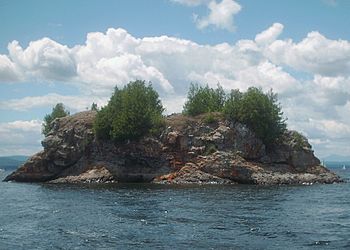Carleton's Prize facts for kids

Carleton's Prize
|
|
| Geography | |
|---|---|
| Highest elevation | 30 ft (9 m) |
| Administration | |
|
United States
|
|
Carleton's Prize is a small, rocky island in Lake Champlain, located in Vermont. It sits in Crescent Bay, just off the southwestern tip of South Hero. This island is famous for a cool story from the American Revolutionary War.
Contents
The Story of Carleton's Prize
This island rises about 30 feet (9 meters) out of the water. It has been called Carleton's Prize since 1776. This was during the American Revolutionary War, a time when the American colonies fought for independence from Great Britain.
A Famous Name
The island got its name from Sir Guy Carleton. He was a British general during the war. The story happened the morning after a big fight called the Battle of Valcour Island.
The Foggy Escape
Local stories say that Lake Champlain was very foggy that morning. An American general named Benedict Arnold was trying to escape. He had what was left of his small fleet of ships. They had hidden behind Valcour Island.
The British didn't believe the Americans could have slipped away in the dark. So, they searched for them to the north and east. In the thick fog, they saw what they thought was an enemy ship.
A Clever Trick
The British ships started firing their cannons at the "ship." Smoke from the black powder used in the cannons made it even harder to see. They kept firing for about an hour. But there was no return fire from the "ship."
Then, a breeze came up, or the fog lifted. The British realized they had not been shooting at a ship at all! They had been firing at Carleton's Prize island. This distraction gave General Arnold time to escape down the lake. He went to Addison, Vermont, where he burned his remaining ships. This stopped the British from capturing them.
Some local stories even say that people from the islands put logs on Carleton's Prize. They made the logs look like ship masts to trick the British. You can still see rust marks on the rock today. These marks are believed to be from the cannon shots fired during that famous foggy morning.
Images for kids
 | Emma Amos |
 | Edward Mitchell Bannister |
 | Larry D. Alexander |
 | Ernie Barnes |


